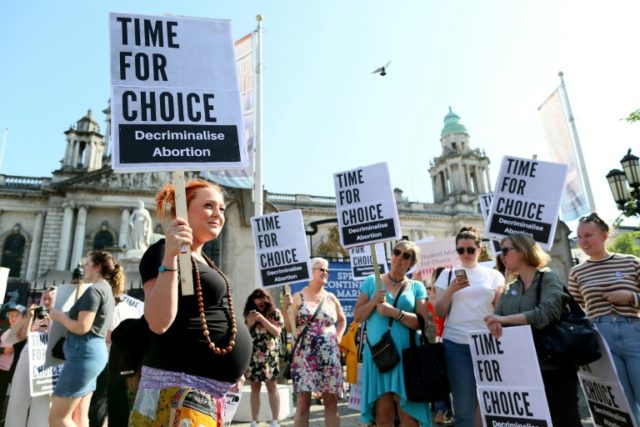London (AFP) – Britain’s Supreme Court will rule Thursday on whether Northern Ireland’s abortion laws contravene human rights legislation, threatening another headache for Prime Minister Theresa May as she seeks to drive Brexit through parliament.
The court will decide whether the laws, which are set by the devolved government in Belfast, breach rights legislation by banning abortion in cases of rape, incest or serious foetal anomaly.
The seven Supreme Court justices last October heard the Northern Ireland Human Rights Commission (NIHRC) claim that the current situation criminalised “exceptionally vulnerable” women.
If they agree, then it will be up to London and Belfast to find a solution, setting May on collision course with the anti-abortion Democratic Unionist Party (DUP).
The DUP is the biggest party in Northern Ireland and also props up May’s minority government, giving her the votes she needs to get Brexit legislation through the House of Commons.
Adding to the complication, Northern Ireland has been unable to form a power-sharing government for over a year, meaning responsibility may fall on Westminster to unilaterally change national law if the judges rule in favour of the NIHRC.
Opposition Labour leader Jeremy Corbyn warned DUP leader Arlene Foster that, in the absence of a functioning assembly, “clearly the UK parliament has responsibility to adhere to human rights standards”.
“Labour’s position has always been that abortion rights should be extended, without fear or favour, across the whole of the UK,” he added.
The NIHRC argued in October that the current law subjects women to “inhuman and degrading” treatment, causing “physical and mental torture” — in violation of the European Convention on Human Rights (ECHR).
– Ireland’s landmark vote –
Unlike in mainland Britain, abortion is illegal in Northern Ireland except when a woman’s life is at risk or there is a permanent or serious danger to her mental or physical health.
The devolved Northern Ireland Assembly voted in February 2016 against legalising abortion in cases of fatal foetal abnormality, rape or incest, and anyone who unlawfully carries out an abortion could be jailed for life.
But the case for change has received fresh impetus from the Republic of Ireland’s landmark referendum vote to legalise abortion last month.
More than 66 percent of voters backed repealing the constitutional ban on terminations, raising pressure on its neighbour to follow suit.
May insists Northern Ireland’s assembly should deal with the issue, but a ruling against its abortion laws could lead to a “declaration of incompatibility” with British legislation.
“We recognise there are strongly held views on all sides of the debate in Northern Ireland and that’s why our focus is on restoring that democratically accountable devolved government,” May’s spokesman said.
“We consider this to be a devolved matter.”
But Sarah Wollaston, a senior MP from May’s Conservative Party, said she expects a cross-party push in the coming months to “directly bring Northern Ireland’s abortion laws in line with the rest of UK”.
Sinn Fein and the SDLP, the two major parties representing Northern Ireland’s Irish Catholics, and the cross-community Alliance Party, back overturning the ban.
Belfast’s High Court ruled in December 2015 that the law was incompatible with article eight of the ECHR — the right to respect for private and family life — due to the absence of exceptions in cases of fatal foetal abnormalities and pregnancies resulting from sexual offences.
But three of Northern Ireland’s most senior judges overturned that decision in June last year, saying it was a question for the elected assembly, not the courts.

COMMENTS
Please let us know if you're having issues with commenting.